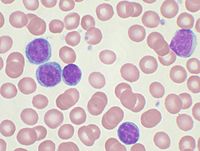
Photo from wikipedia
Despite the development of highly effective, targeted inhibitors of B-cell proliferation and anti-apoptotic pathways in chronic lymphocytic leukemia (CLL), these treatments are not curative, and many patients will develop either… Click to show full abstract
Despite the development of highly effective, targeted inhibitors of B-cell proliferation and anti-apoptotic pathways in chronic lymphocytic leukemia (CLL), these treatments are not curative, and many patients will develop either intolerance or resistance to these treatments. Transformation of CLL to high-grade lymphoma—the so-called Richter syndrome (RS)—remains a highly chemoimmunotherapy-resistant disease, with the transformation occurring following targeted inhibitors for CLL treatment being particularly adverse. In light of this, cellular therapy in the form of allogenic stem cell transplantation and chimeric antigen receptor T-cell therapy continues to be explored in these entities. We reviewed the current literature assessing these treatment modalities in both high-risk CLL and RS. We also discussed their current limitations and place in treatment algorithms.
Journal Title: Frontiers in Oncology
Year Published: 2022
Link to full text (if available)
Share on Social Media: Sign Up to like & get
recommendations!